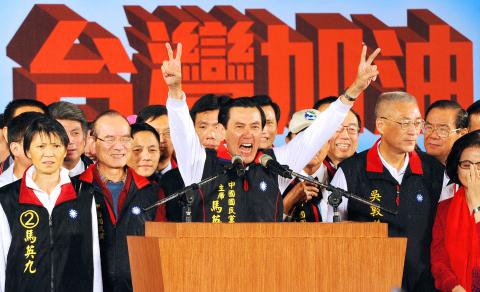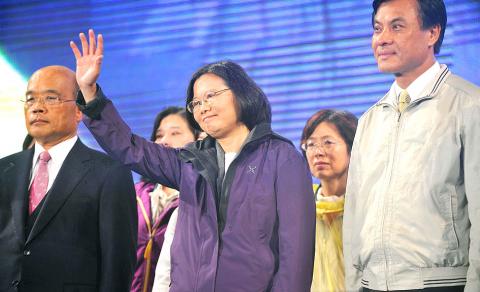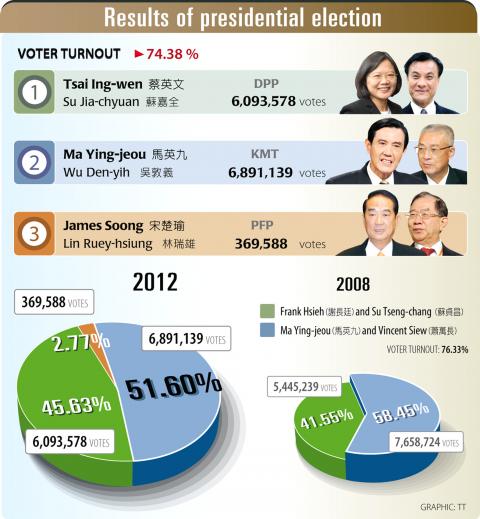President Ma Ying-jeou (馬英九) yesterday secured a second four-year term in office, ending the Democratic Progressive Party’s (DPP) hope for a return to power.
Ma won re-election with more than 6.8 million votes, leading his DPP challenger, Tsai Ing-wen (蔡英文) — who garnered more than 6 million votes — by about 800,000 votes.
According to the figures released by the Central Election Commission (CEC) after the vote counting process was completed shortly before 10pm, Ma received 6,891,139 votes, or 51.6 percent of the total votes; Tsai won 6,093,578 votes, or 45.63 percent of the total; while the People First Party’s James Soong (宋楚瑜) took 369,588 votes, or 2.77 percent of the total votes cast.

Photo: Toshifumi Kitamura, AFP
The voter turnout was 74.38 percent, with 13,452,016 of the 18,086,455 qualified voters casting their votes, CEC figures showed.
Central Election Commission Chairwoman Chang Po-ya (張博雅) announced the numbers immediately after the vote-counting process was completed at a press conference at the Vote Counting and Information Center in Taipei.
“The figures will be finalized at a CEC meeting on Jan. 19,” Chang said. “After the commission confirms the numbers, we will publish the official results.”

Photo: Patrick Lin, AFP
Although Ma won, the total number of votes he received dropped by more than 767,000, from 7,658,724 in 2008, when he received 58.45 percent of the total vote.
On the other hand, votes for the DPP’s presidential candidate increased by 648,000 from 5,445,239 votes in 2008, a growth of 4.05 percent.
Speaking before thousands of jubilant supporters at his national campaign headquarters in Taipei, Ma said his cross-strait policies had resonated with voters.

GRAPHIC: TT
“They gave us support for our policy to put aside differences with the mainland [China], to search for peace and turn it into business opportunities,” he said.
“This is not Ma Ying-jeou’s personal victory, but one for the Taiwanese people. It’s also a victory for our direction toward a clean government, prosperity and peace,” he said.
“I want to thank everyone for your support that has given me the opportunity to achieve the changes Taiwan needs in another four years [in office]. I will never let you down,” he added.
Ma’s re-election is set to be seen in Beijing as a big victory for Chinese President Hu Jintao (胡錦濤), who has moved away from China’s previous policy of repeatedly threatening Taiwan with war and instead has tried to woo Taiwanese by showing the economic benefits of closer ties.
There was no immediate reaction from Beijing on the election results.
Tsai conceded defeat at a press conference in New Taipei City (新北市) soon after Ma spoke to his supporters.
Tsai congratulated Ma on his victory and offered to resign immediately as DPP chairperson, saying that she took full responsibility for the loss.
“It was never easy to challenge an incumbent president. We didn’t do well enough in central and northern Taiwan. I am sorry that I have let our supporters down,” Tsai said.
“I know everyone is sad about the result. It’s OK to cry,” she added. “It is OK to feel depressed and disappointed, but don’t be frustrated and don’t give up. We still need to fight for Taiwan with optimism.”
Tsai urged Ma to listen to the people’s voice in his second term and despite his victory, she still thinks that a domestic consensus is essential before engaging in any further negotiations with Beijing.
She expressed her gratitude to her supporters, saying that their determination for reform should be carried on and that the DPP would be back in the future.
This was the second time Soong has run for president, following his initial bid in 2000, when he received 4,664,932 votes — 36.8 percent of the total votes at the time — and was the candidate with the second- highest number of votes.

Tropical Storm Gaemi strengthened into a typhoon at 2pm yesterday, and could make landfall in Yilan County tomorrow, the Central Weather Administration (CWA) said yesterday. The agency was scheduled to issue a sea warning at 11:30pm yesterday, and could issue a land warning later today. Gaemi was moving north-northwest at 4kph, carrying maximum sustained winds near its center of up to 118.8kph and gusts of 154.8kph. The circumference is forecast to reach eastern Taiwan tomorrow morning, with the center making landfall in Yilan County later that night before departing from the north coast, CWA weather forecaster Kuan Shin-ping (官欣平) said yesterday. Uncertainty remains and

SEA WARNING LIKELY: The storm, named Gaemi, could become a moderate typhoon on Wednesday or Thursday, with the Taipei City Government preparing for flooding A tropical depression east of the Philippines developed into a tropical storm named Gaemi at 2pm yesterday, and was moving toward eastern Taiwan, the Central Weather Administration (CWA) said. Gaemi could begin to affect Taiwan proper on Tuesday, lasting until Friday, and could develop into a moderate typhoon on Wednesday or Thursday, it said. A sea warning for Gaemi could be issued as early as Tuesday morning, it added. Gaemi, the third tropical storm in the Pacific Ocean this typhoon season, is projected to begin moving northwest today, and be closest to Taiwan on Wednesday or Thursday, the agency said. Today, there would likely

DISRUPTIONS: The high-speed rail is to operate as normal, while several airlines either canceled flights or announced early departures or late arrivals Schools and offices in 15 cities and counties are to be closed today due to Typhoon Gaemi, local governments announced last night. The 15 are: Taipei, New Taipei City, Taoyuan, Tainan, Keelung, Hsinchu and Kaohsiung, as well as Yilan, Hualien, Hsinchu, Miaoli, Chiayi, Pingtung, Penghu and Lienchiang counties. People should brace for torrential rainfall brought by the storm, with its center forecast to make landfall on the east coast between tonight and tomorrow morning, the Central Weather Administration (CWA) said. The agency issued a sea warning for the typhoon at 11:30pm on Monday, followed by a land warning at 11:30am yesterday. As of

CASUALTY: A 70-year-old woman was killed by a falling tree in Kaohsiung as the premier warned all government agencies to remain on high alert for the next 24 hours Schools and offices nationwide are to be closed for a second day today as Typhoon Gaemi crosses over the nation, bringing torrential rain and whipping winds. Gaemi was forecast to make landfall late last night. From Tuesday night, its outer band brought substantial rainfall and strong winds to the nation. As of 6:15pm last night, the typhoon’s center was 20km southeast of Hualien County, Central Weather Administration (CWA) data showed. It was moving at 19kph and had a radius of 250km. As of 3pm yesterday, one woman had died, while 58 people were injured, the Central Emergency Operation Center said. The 70-year-old